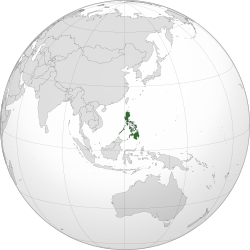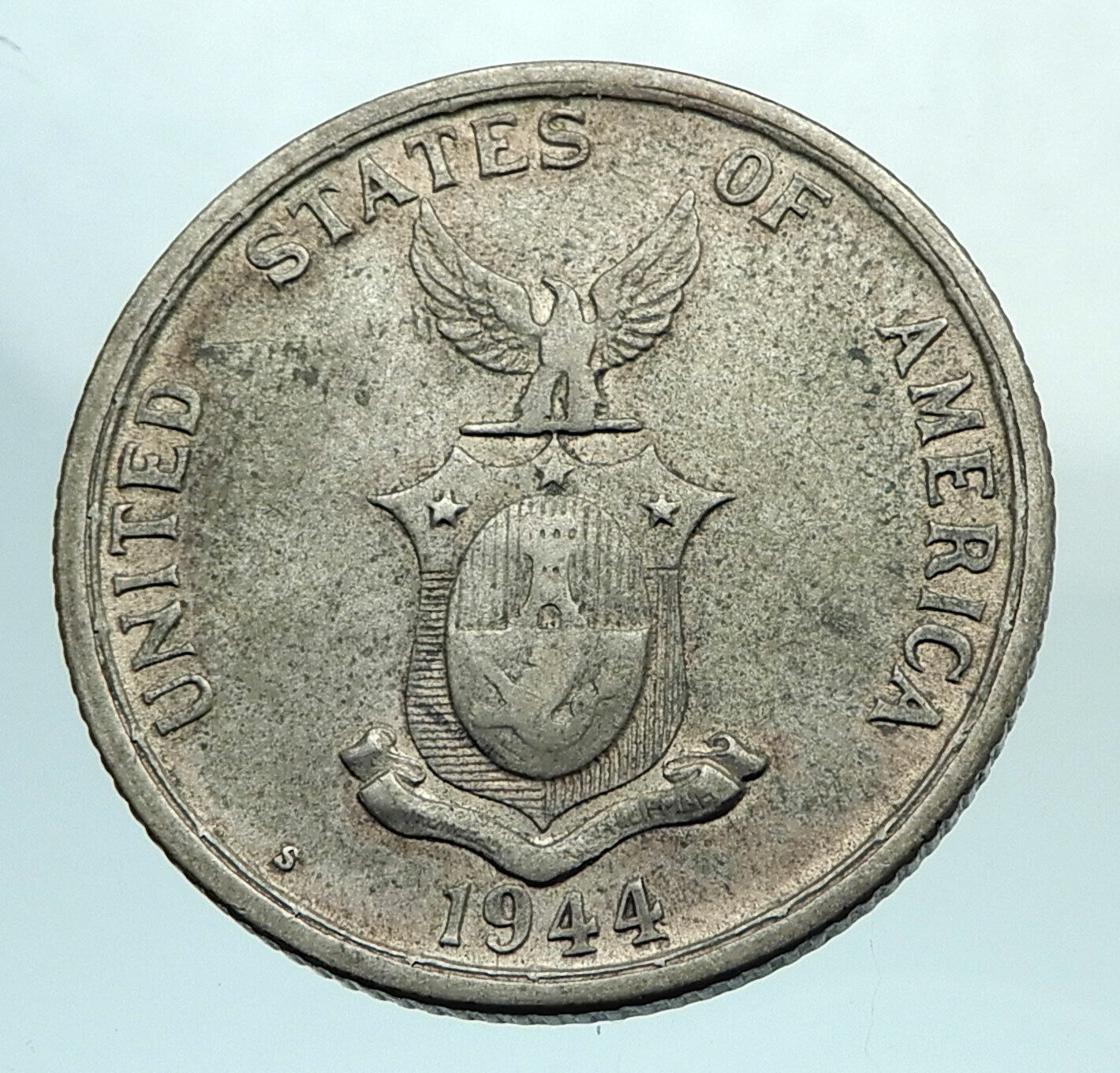|
Philippines
100th Anniversary Birth of Apolinario Mabini
1964 Silver One Peso 38mm (26.79 grams) 0.900 Silver (0.7475 oz. ASW)
Reference: KM# 194
APOLINARIO MABINI CENTENARY * NATIONAL HERO *, Bust of Apolinario Mabini facing dividing date 1864 1964.
CENTRAL BANK OF THE PHILIPPINES ◦ ONE PESO ◦ around coat-of-arms of the Philippines.
You are bidding on the exact item pictured, provided with a Certificate of Authenticity and Lifetime Guarantee of Authenticity.
 Apolinario Mabini y Maranan (July 23, 1864 — May 13, 1903) was a Filipino revolutionary leader , educator , lawyer , and statesman who served first as a legal and constitutional adviser to the Revolutionary Government , and then as the first Prime Minister of the Philippines upon the establishment of the First Philippine Republic . Apolinario Mabini y Maranan (July 23, 1864 — May 13, 1903) was a Filipino revolutionary leader , educator , lawyer , and statesman who served first as a legal and constitutional adviser to the Revolutionary Government , and then as the first Prime Minister of the Philippines upon the establishment of the First Philippine Republic .
Two of his works, El Verdadero Decalogo (The True Decalogue, June 24, 1898), and Programa Constitucional dela Republica Filipina (The Constitutional Program of the Philippine Republic, 1898) became instrumental in the drafting of what would eventually be known as the Malolos Constitution .
Mabini performed all his revolutionary and governmental activities despite having lost the use of both his legs to Polio shortly before the Philippine Revolution of 1896.
Mabini’s role in Philippine history saw him confronting first Spanish Colonial Rule in the opening days of the Philippine Revolution, and then American colonial rule in the days of the Philippine–American War. The latter saw Mabini captured and exiled to Guam by American colonial authorities, allowed to return only two months before his eventual death in May, 1903.
  The Philippines, officially known as the Republic of the Philippines (Filipino: Republika ng Pilipinas), is a sovereign island country in Southeast Asia situated in the western Pacific Ocean. It consists of about 7,641 islands that are categorized broadly under three main geographical divisions from north to south: Luzon , Visayas , and Mindanao . The capital city of the Philippines is Manila and the most populous city is Quezon City , both part of Metro Manila . The Philippines, officially known as the Republic of the Philippines (Filipino: Republika ng Pilipinas), is a sovereign island country in Southeast Asia situated in the western Pacific Ocean. It consists of about 7,641 islands that are categorized broadly under three main geographical divisions from north to south: Luzon , Visayas , and Mindanao . The capital city of the Philippines is Manila and the most populous city is Quezon City , both part of Metro Manila .
 The Philippines’ location on the Pacific Ring of Fire and close to the equator makes the Philippines prone to earthquakes and typhoons, but also endows it with abundant natural resources and some of the world’s greatest biodiversity . The Philippines has an area of approximately 300,000 square kilometers (115,831 sq mi), and a population of more than 100 million with faster growth than any other east Asian country. It is the seventh-most populated country in Asia and the 12th most populated country in the world. An additional 12 million Filipinos live overseas , comprising one of the world’s largest diasporas . Multiple ethnicities and cultures are found throughout the islands. In prehistoric times, Negritos were some of the archipelago’s earliest inhabitants. They were followed by successive waves of Austronesian peoples . Exchanges with Chinese, Malay , Indian , and Islamic states occurred. Then, various nations were established under the rule of Datus , Rajahs , Sultans Lakans.. The Philippines’ location on the Pacific Ring of Fire and close to the equator makes the Philippines prone to earthquakes and typhoons, but also endows it with abundant natural resources and some of the world’s greatest biodiversity . The Philippines has an area of approximately 300,000 square kilometers (115,831 sq mi), and a population of more than 100 million with faster growth than any other east Asian country. It is the seventh-most populated country in Asia and the 12th most populated country in the world. An additional 12 million Filipinos live overseas , comprising one of the world’s largest diasporas . Multiple ethnicities and cultures are found throughout the islands. In prehistoric times, Negritos were some of the archipelago’s earliest inhabitants. They were followed by successive waves of Austronesian peoples . Exchanges with Chinese, Malay , Indian , and Islamic states occurred. Then, various nations were established under the rule of Datus , Rajahs , Sultans Lakans..
The arrival of Ferdinand Magellan Homonhon, Eastern Samar in 1521 marked the beginning of Hispanic colonization. In 1543, Spanish explorer Ruy López de Villalobos named the archipelago Las Islas Filipinas in honor of Philip II of Spain . With the arrival of Miguel López de Legazpi from Mexico City, in 1565, the first Hispanic settlement in the archipelago was established. The Philippines became part of the Spanish Empire for more than 300 years. This resulted in Roman Catholicism becoming the dominant religion. During this time, Manila became the western hub of the trans-Pacific trade connecting Asia with Acapulco in the Americas using Manila galleons .
As the 19th century gave way to the 20th, there followed in quick succession the Philippine Revolution , which spawned the short-lived First Philippine Republic , followed by the bloody Philippine–American War of conquest by US military force. Aside from the period of Japanese occupation , the United States retained sovereignty over the islands until after World War II , when the Philippines was recognized as an independent nation. Since then, the Philippines has often had a tumultuous experience with democracy, which included the overthrow of a dictatorship by a non-violent revolution .
The nation’s large population and economic potential have led it to be classified as a middle power . It is a founding member of the United Nations , World Trade Organization , Association of Southeast Asian Nations , the Asia-Pacific Economic Cooperation forum, and the East Asia Summit . It also hosts the headquarters of the Asian Development Bank . The Philippines is considered to be an emerging market and a newly industrialized country , which has an economy transitioning from being one based on agriculture to one based more on services and manufacturing.
|





 Apolinario Mabini y Maranan (July 23, 1864 — May 13, 1903) was a Filipino revolutionary leader , educator , lawyer , and statesman who served first as a legal and constitutional adviser to the Revolutionary Government , and then as the first Prime Minister of the Philippines upon the establishment of the First Philippine Republic .
Apolinario Mabini y Maranan (July 23, 1864 — May 13, 1903) was a Filipino revolutionary leader , educator , lawyer , and statesman who served first as a legal and constitutional adviser to the Revolutionary Government , and then as the first Prime Minister of the Philippines upon the establishment of the First Philippine Republic .
 The Philippines, officially known as the Republic of the Philippines (Filipino:
The Philippines, officially known as the Republic of the Philippines (Filipino:  The Philippines’ location on the Pacific Ring of Fire and close to the equator makes the Philippines prone to earthquakes and typhoons, but also endows it with abundant natural resources and some of the world’s greatest biodiversity . The Philippines has an area of approximately 300,000 square kilometers (115,831 sq mi), and a population of more than 100 million with faster growth than any other east Asian country. It is the seventh-most populated country in Asia and the 12th most populated country in the world. An additional 12 million Filipinos live overseas , comprising one of the world’s largest diasporas . Multiple ethnicities and cultures are found throughout the islands. In prehistoric times, Negritos were some of the archipelago’s earliest inhabitants. They were followed by successive waves of Austronesian peoples . Exchanges with Chinese, Malay , Indian , and Islamic states occurred. Then, various nations were established under the rule of Datus , Rajahs , Sultans Lakans..
The Philippines’ location on the Pacific Ring of Fire and close to the equator makes the Philippines prone to earthquakes and typhoons, but also endows it with abundant natural resources and some of the world’s greatest biodiversity . The Philippines has an area of approximately 300,000 square kilometers (115,831 sq mi), and a population of more than 100 million with faster growth than any other east Asian country. It is the seventh-most populated country in Asia and the 12th most populated country in the world. An additional 12 million Filipinos live overseas , comprising one of the world’s largest diasporas . Multiple ethnicities and cultures are found throughout the islands. In prehistoric times, Negritos were some of the archipelago’s earliest inhabitants. They were followed by successive waves of Austronesian peoples . Exchanges with Chinese, Malay , Indian , and Islamic states occurred. Then, various nations were established under the rule of Datus , Rajahs , Sultans Lakans..




